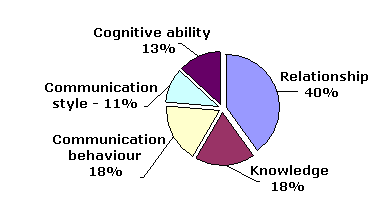Yes, Dave. I am Johnnie's evil twin, exiled to other side of the world by the Moore Clan. The Moore Clan run everything. That latte you had yesterday? Us. Iraq? Us. Wolfmother? That was us too (sorry). I look exactly like Johnnie except for a neat yet unflattering goatie beard.
Anyway back to tools. I don't want to blog too much about blogging - it's onanistic & boring. I worry about disappearing up my own fundament - if I did that then where would I get all my statistics from? However, the main addition I would make to Bain's advice is: Don't start with the blog.
My corporate blogging method would be:
- Give everyone in your organisation permission to set up their own blogger/typepad account. Ask them to give you a link to their RSS feed when they've done that.
- Give them a list of things they absolutely cannot talk about. Try to make it relatively short. You can't make this list short? Then may be you aren't ready for this yet. If they want to check anything with you then give them that option & respond quickly & decisively.
- Make it clear to their managers that blogging should not be punished - provided people are doing their jobs. If they are not doing their jobs then find out why - don't just blame the blogging.
- Advise them to be nice to people. Remind them that this is in public. "The evil that men do lives after them".
- Advise them to think of 3-4 business-related things that they are passionate about.
- Advise them to find 10 people that blog about each of those things. Look at the posts. Look at the comments fields. Do these people link to each other? What world are they about to step into?
- Let them get on with it. They can work out when they feel ready to step into conversations. They can talk about that with you if they want.
- Read their RSS feeds & give them a bit of encouragement. Be their first audience.
- Only intervene if someone really screws up. You can't handle someone screwing up? Then may be you aren't ready for this yet. Suggest that your bloggers talk to each other about their experiences.
- Don't treat them as another "channel" for messages - they are not a ventriloquist's dummy. But do treat them as conversational partners.
- See who has kept it going after 6 months. Do something nice for them (preferably involving the blog).
Blogging allows you to:
- Talk to customers & partners at all levels.
- Scan the environment for change.
- Identify potential thought leaders.
All for very little cost.
I am not going to pretend that there's anything maddenly original here but what do people think. Have I over engineered this? Underengineered it? What have I missed?
P.S. I am with Dave on the inaccurate use of methodology. Putting ology on the end of something does not make you cleverer.





